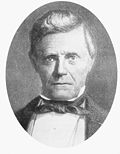General election
With the question of slavery in the background, Mississippi politics slowly became dominated by the issue. Joseph W. Matthews, an outspoken defender of slavery and military leader, was nominated as the Democratic candidate. Alexander B. Bradford, major of the Mississippi militia in the Mexican-American War and lawyer, was nominated for the Whig ticket, a party with a reputation for infrastructure improvements and a moderate slavery stance. Matthews won by a two-to-one margin. [2] [3]
This page is based on this
Wikipedia article Text is available under the
CC BY-SA 4.0 license; additional terms may apply.
Images, videos and audio are available under their respective licenses.



